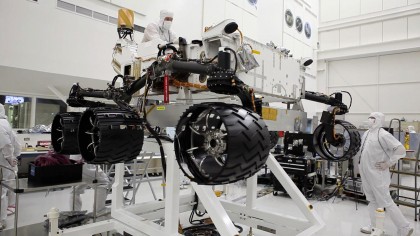10 bits of future tech we wish existed right now
Tech's boldest pledges examined

While nobody really wants a front row seat to the End of Days extravaganza, wouldn't it be nice to stick around for another hundred years or so? You know, just to see what the tech's like?
As our favourite pastime continues to improve at an exponential rate it really makes one wonder what in store come the few decades. Sadly, not even the inherent promise of Moore's Law can save us from the inevitable big, dark nap that awaits us all.
That means, notwithstanding some miraculous cure for aging and disease, we're going to be missing out on some pretty neat stuff 50-60 years from now. Some will leave you praying for reincarnation, while others have you digging the hole yourself.
1. Invisibility cloaks
In lacking the magical touch of Lady Galadriel, humans have found the small matter of creating invisibility garments a little more challenging than the Elvish did. However, a group of students at Zhejiang University in China made the most recent breakthrough, using a process called topological optimisation.
By creating a computerised replica of a cloak made from Teflon they've been able to feed predictive data to the garment, based on the environment. That creates a topology that minimises the distortion of light as it passes by, hence a pretty darn decent invisibility cloak. Will they get good enough to completely shield ourselves from the world within 50 years? Unlikely.
2. The Mission to Mars

As we continue to find new and interesting ways to destroy this perfectly good planet, attentions seem certain to turn to whether we can repeat the feat on some other poor landmass. Eric C. Anderson, co-founder and chairman of commercial space company Space Adventures reckons we'll be on our way to Mars within the "next 30 to 60 years" with "a few million" living there in a century. "That should be really exciting, to be alive during that stage of humanity's history," he said.
Unfortunately, none of us will be. There's also the small matter of terraforming Mars and the creation of a retainable atmosphere to make it even remotely habitable for humans.
Get daily insight, inspiration and deals in your inbox
Sign up for breaking news, reviews, opinion, top tech deals, and more.
3. Total Immersion Virtual Reality
While the world is super excited for the Oculus Rift gaming headset to bring us a modicum closer to the Virtual Reality gaming environment we'd envisioned as kids, we're still hoping for the 'Better Than Life' game from Red Dwarf. You know the one, where Lister eats caviar vindaloo and Cat dates a reverse mermaid?
According to the Google futurologist Rey Kurzweil, virtual will compete with reality once computers become small and powerful enough to be implanted into our brains, leading to a merger of human and computer mindpower. Pretty soon after that we'll be able to experience games through our own nervous systems rather than a heads-up display. Nanobots will dance around our bodies replacing real senses with those from the virtual environment we're inhabiting. Kurzweil reckons those blood cell-sized computers are 25 years away. Seems optimistic, but we'd sure like to give that a go before we're granted eternal rest.
4. We will all travel in tubes
"Get the scientists working on the tube technology," decreed Jack Black while outlining his vision for a dystopian, government-free society in Tenacious D's City Hall. Space X founder and, real-life Tony Stark, Elon Musk has heeded the call with his solar powered Hyperloop train that would whiz commuters around the US at 800 miles per hour in an elevated, steel vacuum tubes. He wants San Diego to San Francisco by 2029 and reckons it'll only cost about $6 billion with tickets cheaper than an airfare.
The tech logic, by all accounts, is sound, but getting the funding and pushing through the regulatory and political minefield limits the chances of this happening anytime soon, if ever. Meanwhile California pushes on with plans to build a $70 billion+ high-speed train line that's four times slower than Musk's Hyperloop.
A technology journalist, writer and videographer of many magazines and websites including T3, Gadget Magazine and TechRadar.com. He specializes in applications for smartphones, tablets and handheld devices, with bylines also at The Guardian, WIRED, Trusted Reviews and Wareable. Chris is also the podcast host for The Liverpool Way. As well as tech and football, Chris is a pop-punk fan and enjoys the art of wrasslin'.
